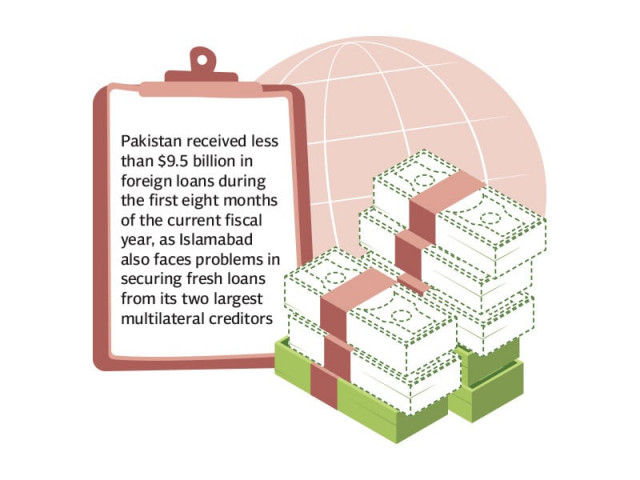Foreign loans remain low at $9.5b
Pakistan faces hurdles in way of securing funds from large multilateral lenders

Pakistan received foreign loans of less than $9.5 billion during the first eight months of the current fiscal year and also faced problems in securing fresh loans from its two largest multilateral lenders.
Overall disbursements from foreign creditors slowed down during the July-February period of the current fiscal year despite Pakistan having the umbrella of the International Monetary Fund (IMF). The government received only $318 million from foreign lenders in February.
The Economic Affairs Division on Thursday reported the latest disbursement figures. The data reported by the economic affairs ministry and the central bank showed that Pakistan secured nearly $9.5 billion in foreign loans during the first eight months of the current fiscal year. Pakistan also secured $6 billion in deposit rollovers from Saudi Arabia, China and the United Arab Emirates (UAE), taking total external sector inflows to $15.4 billion, or 62% of its needs.
The country received these loans in the shape of budget and balance of payments support as well as project financing. But the gross foreign exchange reserves held by the central bank remained at $8 billion despite purchasing more than $2 billion from the domestic market.
After facing problems in getting foreign commercial loans and floating Eurobonds, the federal government is also encountering difficulties in achieving the targets of fresh loans from the World Bank and the Asian Development Bank (ADB).
Finance Minister Muhammad Aurangzeb on Thursday met with the ADB country head and requested financial support during the current fiscal year as well as under the next IMF programme. The IMF money alone will not solve Pakistan’s fiscal woes.
The government received only $222 million from multilateral lenders in February, with the total tally standing at $2.6 billion for the current fiscal year. It still expects to receive $5.2 billion during the year. However, the target may be missed.
The ADB gave only $635 million in eight months, constituting 31% of the annual estimate of $2.1 billion. It seems that the Ministry of Finance and the Ministry of Economic Affairs had set unrealistic targets at the time of announcement of the budget.
Aurangzeb highlighted the ADB’s assistance through policy-based lending to mitigate the impact of the pandemic and floods, according to a finance ministry statement. The status of policy-based programmes, including the Public-Private Partnership (PPP) programme and the Climate and Disaster Resilience Enhancement Programme (CDREP) was also discussed.
Pakistan has not yet met all the conditions agreed under the PPP and CDREP programmes. The government has not approved the PPP policy so far. Similarly, the conditions for CDREP have not been agreed and there is a lack of clarity on the role of different government ministries.
Sources said that as against the budgetary target of $2.1 billion in loans from the ADB, Pakistan may hardly receive $1.3 billion during the current fiscal year.
The country has not been successful in getting the Geneva pledges fully materialised for the victims of 2022 floods.
The World Bank was the largest lender after the IMF as it disbursed $1.4 billion in eight months. The IMF has given $1.9 billion out of a $3 billion loan package.
Pakistan has budgeted to receive $2.3 billion from the World Bank in this fiscal year and authorities hope to get at least $2 billion.
The government’s failure to fully utilise its borrowing options highlights poor budgeting and planning.
The Islamic Development Bank disbursed only $200 million in the current fiscal year out of the annual estimate of $500 million. Although Pakistan has fully tapped the budgeted $600 million Saudi oil facility, it did not receive any fresh funds last month.
The annual budget estimate for commercial loans is $4.5 billion while efforts to secure at least $600 million from China have not borne fruit.
China has linked its financing with a prior settlement plan for Rs515 billion that Pakistan owes to the Chinese power plants. Another Chinese commercial loan of $1 billion is maturing in June where Pakistan is seeking its rollover.
Finance Minister Aurangzeb voiced hope that the blocked commercial funding pipelines would be opened after the IMF approved its Extended Fund Facility.
Bilateral lenders extended $768 million to Pakistan during the July-February period, excluding rollovers.
Pakistan received $686 million from overseas Pakistanis as investment in the Naya Pakistan Certificates, exceeding the annual target.
The country is required to repay $11 billion in the remaining period of the current fiscal year. But it expects rollover of only $6 billion, leaving a gap of $5 billion.
The ministry is hoping to receive a $1.1 billion tranche from the IMF, some fresh support from the World Bank and the ADB to make up for the shortfall.
The central bank will also buy dollars from the market to support repayments and maintain reserves at current levels.
Published in The Express Tribune, March 22nd, 2024.
Like Business on Facebook, follow @TribuneBiz on Twitter to stay informed and join in the conversation.



















COMMENTS
Comments are moderated and generally will be posted if they are on-topic and not abusive.
For more information, please see our Comments FAQ